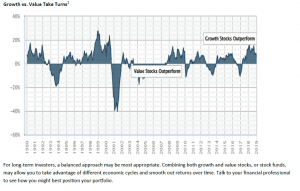


A Review of 2020 and Preview of 2021
January 21, 2021


Unique Financial Planning Considerations for Women
February 11, 2021For growth stock investors, it's been a heady time. Growth stocks recorded a total return of 33.5% for the year ended December 31, 2020, significantly eclipsing value's 1.4% showing. And over the past five years, growth has outperformed value by an average of over 8 percentage points.1
Does this mean that value investors should rethink their strategy? Probably not. As history has shown, leadership between growth and value tends to shift back and forth, depending on the stage of the market and economic cycle. Which of the two outperforms the other is ultimately attributable to their fundamental characteristics.
Growth and Value Defined
Growth stocks represent companies that have demonstrated better-than-average gains in earnings in recent years and that have the potential to continue delivering high levels of profit growth.
- Key characteristics of growth funds include:
- Higher prices than the broader market. Investors are typically willing to pay high price-to-earnings multiples with the expectation of selling shares at even higher prices as the companies continue to grow.
- High earnings growth records. While the earnings of some companies may be depressed during periods of slow-er economic improvement, growth companies may have the potential to achieve high earnings growth in different economic environments.
- More volatile than the broader market. The risk in buying a given growth stock is that its lofty price could fall sharply on any negative news about the company, particularly if earnings disappoint on Wall Street.
Value fund managers look for companies that have fallen out of favor but still have good fundamentals. The value group may also include stocks of new companies that have yet to be discovered by investors.
- Key characteristics of value funds include:
- Lower prices than the broader market. The idea behind value investing is that stocks of good companies will bounce back in time if and when their true value is recognized by other investors.
- Priced below similar companies in their industry. Many value investors believe that a majority of value stocks are created due to investors' overreacting to recent company problems, such as disappointing earnings, negative publicity, or legal problems, all of which may raise doubts about the company's long-term prospects.
- Somewhat less risk carried than the broader market. However, as they take time to turn around, value stocks may carry more risk of price fluctuation than growth stocks.
Growth or Value... or Both?
Which strategy -- growth or value -- is likely to produce higher returns over the long term? The battle between growth and value investing has been going on for years, with no definitive winner. History shows us that growth stocks, in general, have the potential to perform better when interest rates are falling and company earnings are rising. However, they may also be the first to be punished when the economy is cooling. Value stocks, often stocks of cyclical industries, may do well early in an economic recovery but are typically more likely to lag in a sustained bull market.


1 Source: DST Retirement Solutions, LLC, an SS&C company. Based on total returns of the S&P 500 Growth and Value indexes. 2 Source: ChartSource®, DST Retirement Solutions, LLC, an SS&C company. Based on 12-month rolling returns from 1990 to 2019. Growth and value stocks are represented by composites of the S&P 500/Barra Growth and Value indexes and the S&P 500 Growth and Value indexes, which are unmanaged indexes generally considered representative of growth and value large-cap stocks. It is not possible to invest directly in an index. Index performance does not reflect the effects of investing costs and taxes. Actual results would vary from benchmarks and would likely have been lower. Stock investing involves risk, including loss of principal. Past performance is not a guarantee of future results. (CS000047) Investing in mutual funds involves risk, including loss of principal.
Footnotes/Disclaimers/Disclosures
© 2019 DST Systems, Inc. Reproduction in whole or in part prohibited, except by permission. All rights reserved. Not responsible for any errors or omissions. The opinions voiced in this material are for general information only and are not intended to provide specific advice or recommendations for any individual. All performance referenced is historical and is no guarantee of future results. All indices are unmanaged and may not be invested into directly. This article was prepared by DST Systems Inc. This information is not intended to be a substitute for specific individualized tax or legal advice. We suggest that you discuss your specific situation with a qualified tax or legal advisor. Please consult me if you have any questions. LPL Financial Representatives offer access to Trust Services through The Private Trust Company N.A., an affiliate of LPL Financial.
For Public Use: Tracking:1-05079955 Exp: 2/2023
Securities and advisory services offered through LPL Financial (LPL), a registered investment advisor and broker-dealer (member FINRA/SIPC). Insurance products are offered through LPL or its licensed affiliates. To the extent you are receiving investment advice from a separately registered inde-pendent investment advisor that is not an LPL Financial affiliate, please note that LPL Financial makes no representation with respect to such entity.
If your financial professional is located at a bank or credit union, please note that the bank/credit union is not registered as a broker-dealer or investment advi-sor. Registered representatives of LPL may also be employees of the bank/credit union. These products and services are being offered through LPL or its affiliates, which are separate entities from, and not affiliates of, the bank/credit union. Securities and insurance offered through LPL or its affiliates are:
Not Insured by FDIC/NCUA or Any other Government Agency| Not Bank/Credit Union Guaranteed | Not Bank/Credit Union Deposits or Obligations | February 2021




